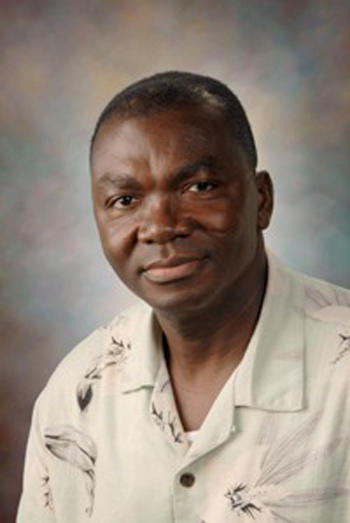Grantee Spotlight: Joseph Kofi Agyin, PhD, MBA - Exploring Bone-Targeted Proteasome Inhibitors to Cure Multiple Myeloma
, by CRCHD staff
Joseph Kofi Agyin, Ph.D., M.B.A., is an Assistant Professor of Chemistry at the University of Texas Health Science Center at San Antonio, Texas. There he is studying the design and synthesis of bone-targeted proteasome inhibitors for treating multiple myeloma, a blood cancer that develops in the bone marrow.
The incidence of multiple myeloma is twice as high in African Americans compared with the white population. There is currently no cure for multiple myeloma but there are several promising new therapies. Multiple myeloma causes bone destruction, and depending on the location of the cancer, also causes injury to surrounding tissues.
Agyin is studying the effectiveness of a class of proteasome inhibitors, such as Bortezomib (Velcade), as a way to reduce toxicity and improve treatment outcome. Agyin believes the benefit to using Bortezomib is it not only kills myeloma cells, but also stimulates new bone formation.
“There is considerable evidence suggesting that proteasome inhibitors inhibit cell growth and survival, and promote bone formation,” Agyin said. “By joining bisphosphonates [which are known to bind avidly to bone mineral] to proteasome inhibitors, we believe we can target the hybrid compounds to bone, in order to achieve greater, and thus potentially, more effective concentrations of the proteasome inhibitors locally.”
He believes this new approach will result in an increased concentration of anti-cancer drugs at the tumor site while avoiding significant toxicity to the body.
In 2013, Agyin and his lab first reported on the synthesis and evaluation of bone-targeted proteasome inhibitors. (see Bioorg Med Chem Lett. 2013 Dec 1;23(23):6455-8. ).
But Agyin cautions it could take years of testing before his new compounds could be used in clinical trials or at the bedside.
Agyin is a CRCHD R21 Grantee. R21 grants are exploratory awards designed to promote workforce diversity in basic cancer science. Agyin’s research focuses on the design and synthesis of new and complex compounds for the treatment of multiple myeloma and breast cancer. “It is our fervent hope we will change the clinical outcome for these patients with a new group of drugs,” he says.
He received his B.S. in 1986 in Chemistry from the University of Ghana, Legon, Accra, Ghana. He received his M.S. degree in Chemistry in 1993 from the Western Michigan University, Kalamazoo, Michigan. He then received his Ph.D. in Chemistry in1996 from Purdue University, West Lafayette, Indiana. In 2008, Dr. Agyin earned an M.B.A. from Duke University, Fuqua School of Business, Durham, North Carolina.
He has received numerous scientific awards including, the AACR Minority Scholar Award in Cancer Research (2005), AACR Minority-Serving Institution Faculty Scholar Award in Cancer Research/ Susan G. Komen Breast Cancer Foundation (2006), AACR Minority-Serving Institution Faculty Scholar Award in Cancer Research (2007, 2008 and 2014), and 1st Place Poster Presentation Winner at the Center to Reduce Cancer Health Disparities Workshop (2009).
He holds 17 U.S. patents in medical research, and has published more than 30 scientific articles and abstracts.
Learn more about myeloma.
